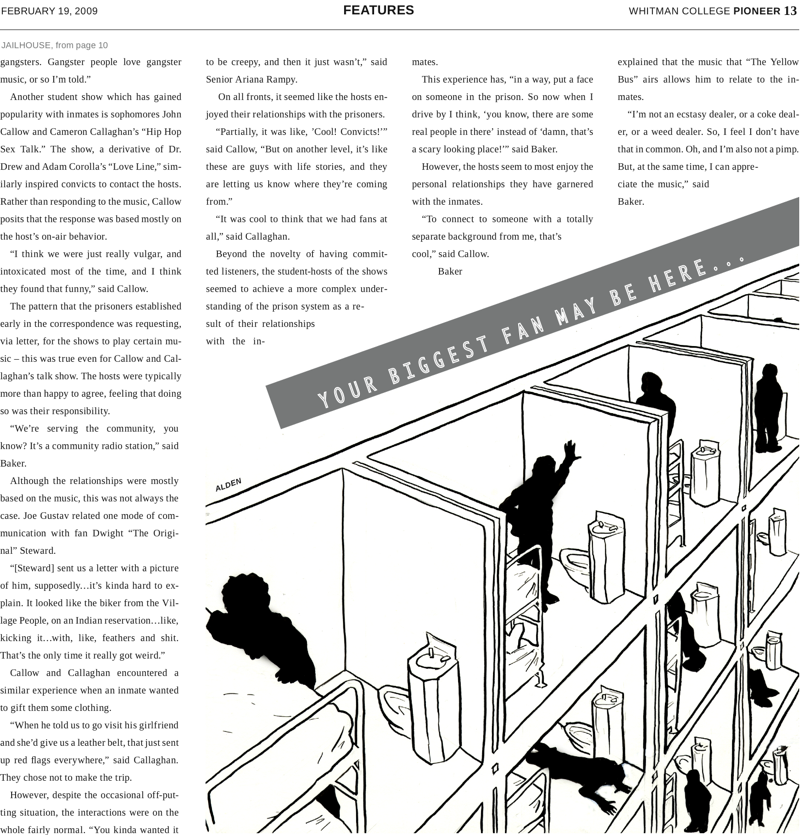This article originally appeared as part of the Featured Section of the February 19th Print edition. To see how this section looked in print click the image thumbnails below.
People actually listen to KWCW, the Whitman radio station. For some shows, the fans are mostly friends and community members. For others, however, their fan base is comprised largely of the incarcerated.
Juniors Joe Gustav and Marshall Baker were contacted by state penitentiary prisoners responding to their late-night Monday show “The Yellow Bus.” The show, which typically plays “hyphy” gangster rap from the SF Bay circa early 1990s to present, has been popular with the prison population from the beginning. According to Baker, prisoners were attracted to the show due to the fact that the hosts “just kinda squawk on the air, and we don’t talk too much sense, and we understand the music… yeah, it’s real stupid music. The prisoners who love our show love stupid music. I can’t say that in general [about prisoners]. You know, they’re gangsters. Gangster people love gangster music, or so I’m told.”
Another student show which has gained popularity with inmates is sophomores John Callow and Cameron Callaghan’s “Hip Hop Sex Talk.” The show, a derivative of Dr. Drew and Adam Corolla’s “Love Line,” similarly inspired convicts to contact the hosts. Rather than responding to the music, Callow posits that the response was based mostly on the host’s on-air behavior.
“I think we were just really vulgar, and intoxicated most of the time, and I think they found that funny,” said Callow.
The pattern that the prisoners established early in the correspondence was requesting, via letter, for the shows to play certain music –– this was true even for Callow and Callaghan’s talk show. The hosts were typically more than happy to agree, feeling that doing so was their responsibility.
“We’re serving the community, you know? It’s a community radio station,” said Baker.
Although the relationships were mostly based on the music, this was not always the case. Joe Gustav related one mode of communication with fan Dwight “The Original” Steward.
“[Steward] sent us a letter with a picture of him, supposedly…it’s kinda hard to explain. It looked like the biker from the Village People, on an Indian reservation…like, kicking it…with, like, feathers and shit. That’s the only time it really got weird.”
Callow and Callaghan encountered a similar experience when an inmate wanted to gift them some clothing.
“When he told us to go visit his girlfriend and she’d give us a leather belt, that just sent up red flags everywhere,” said Callaghan. They chose not to make the trip.
However, despite the occasional off-putting situation, the interactions were on the whole fairly normal. “You kinda wanted it to be creepy, and then it just wasn’t,” said Senior Ariana Rampy.
On all fronts, it seemed like the hosts enjoyed their relationships with the prisoners.
“Partially, it was like, ‘Cool! Convicts!'” said Callow, “But on another level, it’s like these are guys with life stories, and they are letting us know where they’re coming from.”
“It was cool to think that we had fans at all,” said Callaghan.
Beyond the novelty of having committed listeners, the student-hosts of the shows seemed to achieve a more complex understanding of the prison system as a result of their relationships with the inmates.
This experience has, “in a way, put a face on someone in the prison. So now when I drive by I think, ‘you know, there are some real people in there’ instead of ‘damn, that’s a scary looking place!'” said Baker.
However, the hosts seem to most enjoy the personal relationships they have garnered with the inmates.
“To connect to someone with a totally separate background from me, that’s cool,” said Callow.
Baker explained that the music that “The Yellow Bus” airs allows him to relate to the inmates.
“I’m not an ecstasy dealer, or a coke dealer, or a weed dealer. So, I feel I don’t have that in common. Oh, and I’m also not a pimp. But, at the same time, I can appreciate the music,” said Baker.







